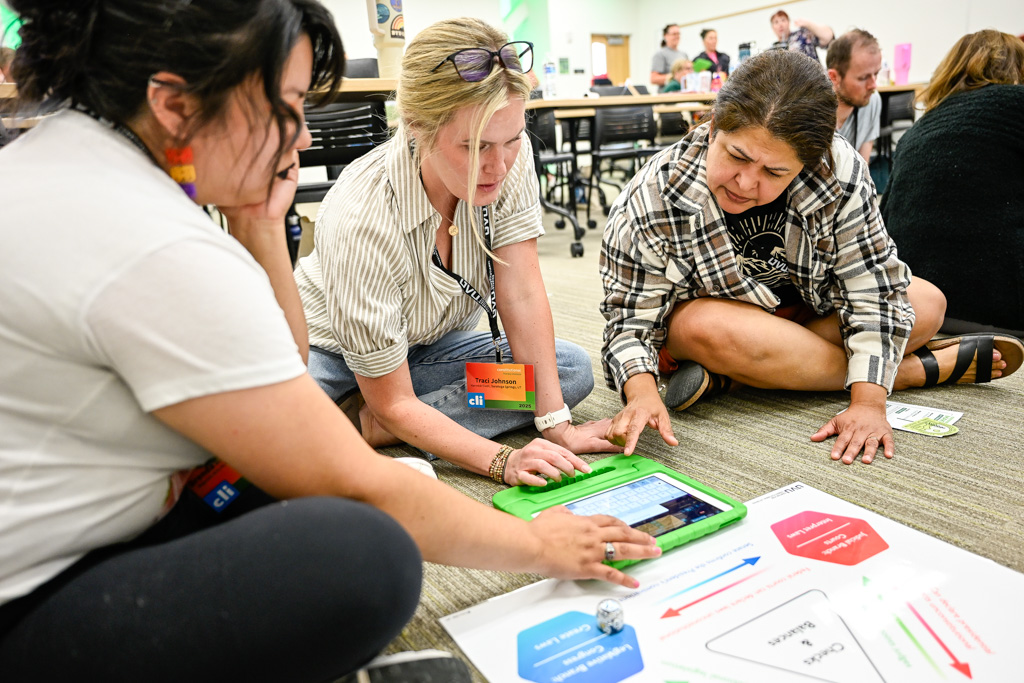

CCS hosts sixth annual Constitutional Literacy Institute June 23–27, 2025
K–12 teacher from Utah, Kansas, and Wisconsin hone their personal understanding of the Constitution and the Founding
Story and photos by Hank McIntire
See photos.
The Center for Constitutional Studies (CCS) held its annual summer Constitutional Literacy Institute (CLI) June 23–27, 2025, on Utah Valley University campus.
More than 50 elementary- and secondary-school teachers from Utah, Kansas, and Wisconsin attended this year’s course, now in its sixth year.
The purpose of CLI is to provide education, resources, and experiences for teachers to increase personal constitutional literacy and then to help their students do the same.
“The rising generation of citizens and leaders need a broad understanding of political thought and practices critical to the perpetuation of constitutional government, ordered liberty, and the rule of law,” said Scott Paul, executive director of CCS and organizer of CLI. “The Constitutional Literacy Institute is a tool for teachers to do just that.”
Constitutional scholars from CCS and Oxford University, as well as other experts from public life, provided instruction to teachers through lectures, discussions, scenarios, and off-campus activities. Among the presenters were these:
-
- Nicholas Cole, Senior Research Fellow, Pembroke College, University of Oxford, and Founder/Director of the Quill Project
- Matthew Brogdon, Senior Director of the Center for Constitutional Studies, Utah Valley University
- Robert Burton, Director of the Civic Thought & Leadership Initiative, Utah Valley University
- Savannah Eccles Johnston, Assistant Professor of Political Science, Salt Lake Community College
- Jeffery Nokes, Associate Dean of the College of Family, Home, and Social Sciences, Brigham Young University
- Axel Ramirez, Professor in the School of Education, Utah Valley University
- Judge Thomas Griffith (retired), U.S. Court of Appeals for the D.C. Circuit
- Bradley Rebeiro, Associate Professor of Law, Brigham Young University Law School
- Lucy Williams, Associate Professor of Law, Brigham Young University Law School
- Steven Steinbach, Chair of History Department, Sidwell Friends School, Washington, D.C.
- Kyle Jensen, Social-Studies Teacher, Jordan School District
- Brittany Holman, Clinical Faculty Associate, Brigham Young University, Social-Studies Teacher, Alpine School District
- Melanie Fisher, Fifth-grade Teacher, Jordan School District
Presenters provided content or shared pedagogical strategies on a number of topics, such as—
-
- The Constitutional Convention of 1787
- The Declaration of Independence
- The Bill of Rights
- Separation of Powers
- Nature of the Federal Union
- The Great Compromise
- Federalism and the Founding
- The Quill Project
- Civility
- Slavery and Reconstruction
- Civil Rights
- Theories of Constitutional Interpretation
- Classroom Adaptation
Evening activities included a learning exercise in the Roots of Knowledge gallery in UVU’s Fulton Library and an excursion to Moon’s Rare Books in Provo, where they experienced stained-glass art in the context of constitutional issues and had up-close views of documents and artifacts related to the American founding, respectively.
After an intense week of study, discussion, and discovery, teachers reflected on what they learned at CLI and what they plan to share with their students in the classroom.
“The instruction this week helped me see the power that teachers have to teach students to behave with civility,” said Shannon Stapley, of South Weber, who teaches 10th- and 11th-graders at West Field High School in Ogden. “They can either be hopeful or cynical, and a lot of what they take is from our attitudes as teachers.“
“I love being with like-minded people this week and seeing creative ways to incorporate founding principles into the classroom,” said Brooke Adrian, of Draper, a fourth-grade teacher at North Star Academy in Bluffdale. “I felt safe to talk about really hard, sometimes messy, deep stuff.”
The discussion and demonstration of the Quill Project, a tool developed at Oxford University that models the negotiations from which emerged the U.S. Constitution and the various state constitutions, was particularly impactful on Stapley.
“In Quill we found documents from Ogden and Weber from women asking for the right to vote in the late 1800s,” she said. “That’s the area where I live and teach, and it made history come alive. I’m excited to take that back to my students.”
As personally enlightening as the course was for the teachers, they all agreed that the real impact will be seen in how their students follow the example of the Founders in blending passion for their views with civility and compromise.
“We can inspire students to believe in the process and stay hopeful and see the beautiful things in local, state, and federal government,” said Stapley. “Yes, we have gotten things wrong, but things can also get better.”
“What we take into the classroom from this instruction is vital to the success of keeping the Constitution solid,” said Adrian. “We have become a divisive nation, so we can agree to disagree and still have a common goal. We can have differing opinions and be respectful and still work toward a common goal. And that’s the most important thing, that we stick together.”

